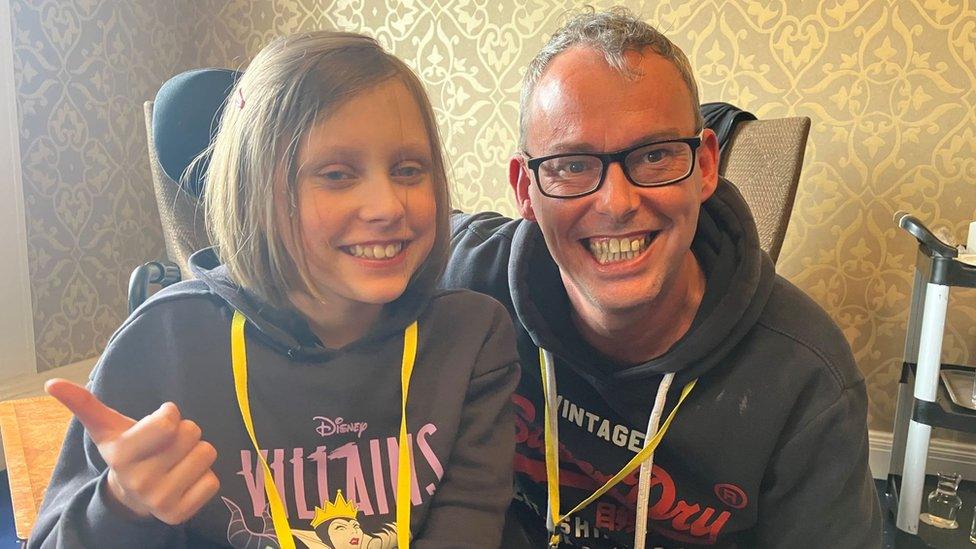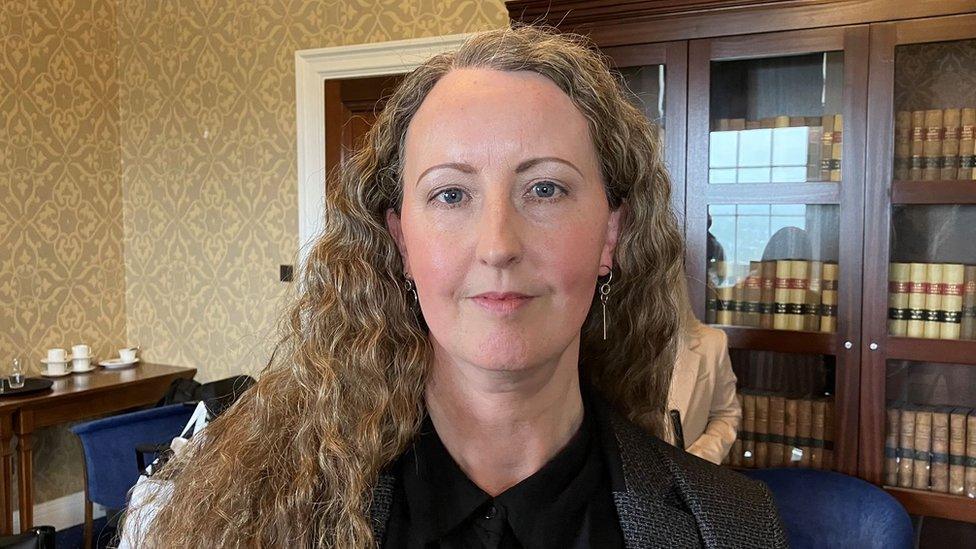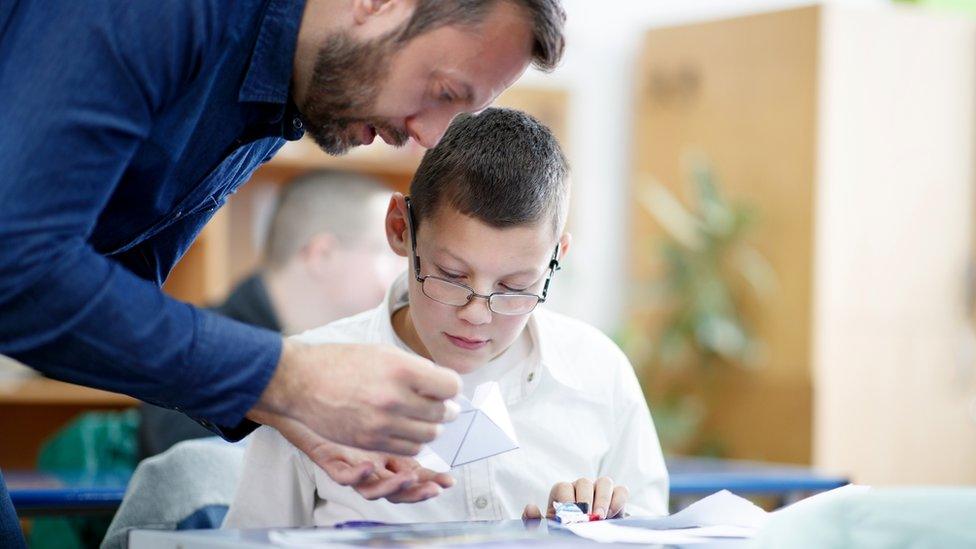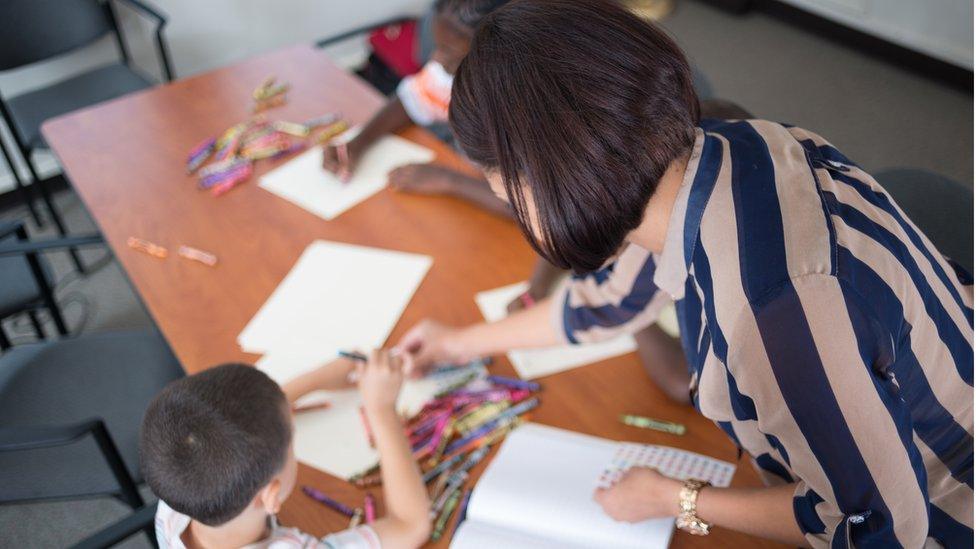Special educational needs: 'I had no friends because of school place delay'
- Published
Special needs pupil 'felt lonely' during school place delay
"I had no friends and I felt lonely - it was very tough on me."
That is what 12-year-old Aurelia - who has cerebral palsy and uses a wheelchair - told politicians at Stormont about her fight to get a place in a post-primary school.
She now attends St Genevieve's in west Belfast, but, like hundreds of other children with special educational needs (SEN), she faced a significant delay getting a place confirmed in 2023.
"I was stuck in my room," she said.
"I was without a school for four months. Last summer at about August I was supposed to go to school and yet they never gave me a school."
While Aurelia is now happy in school, the scars of the fight to get a place, where an accessible toilet could be provided, remain.
"I like the classes, I like the teachers," she said.
"But I just feel very isolated and nervous because at school I missed four months and I needed to catch up.
"The school is great but it's very impossible to catch up."
Aurelia was invited to Stormont to tell MLAs on the Education Committee about her experiences.

Aurelia's dad Drew said they were glad she had now received a school place
Her father Drew also spoke about the "traumatic" impact on the whole family.
"Aurelia missed four months of school and then obviously when she started later you don't have friends when everyone starts their first year of secondary school," he said.
"So it's just had a massive impact on the family and more importantly Aurelia.
"We didn't know how long that time was going to be - we were lucky it was four months.
"So not even knowing she was going to get a school, it's just been traumatic."
He was also critical of the Education Authority (EA), which he said would not answer his emails or calls.
'Crisis mode'
The EA's new interim chief executive Richard Pengelly recently said the organisation had to "up our game" in communicating with parents of children with SEN.
But Rachel Hogan from the Children's Law Centre, who provided advice and help for Aurelia and her family, said more changes were still needed.
"Aurelia is a remarkable young woman, she is very articulate and very insightful," she said.
"She has expressed what she requires the government to do and that's to make schools accessible places for people with disabilities.
"Aurelia couldn't get into school because there was no accessible bathroom and really that's an easy one.
"We have children with very complex needs who need a lot of planning well in advance of changing to year eight and we need to start moving the policies so that we make those plans, fund those plans.
"At the moment I think the education sector is in crisis mode and I don't think we're going to see that resolved this September.
"It's really a long-term planning issue and we have to really drill down and scrutinise why this has been allowed to get to this stage and make sure it doesn't happen ever again."

Rachel Hogan is concerned about the next academic year
On Tuesday, Education Minister Paul Givan committed more money to build new special schools and create more places for children with SEN.
Mr Givan has previously said more than 1,000 children with SEN have been identified as needing a school place in September 2024 and the current system was "simply no longer sustainable".
The chairman of the Education Committee, Alliance MLA Nick Mathison, was one of the politicians who met Aurelia at Stormont.
"It's not acceptable for a young person to watch her peers and her classmates get their place allocated in a straightforward system, and for her to be left with uncertainty and a real fear that she's not going to get a placement that works for her," he told BBC News NI.
"We need to do better for our children with disabilities and special educational needs."
Mr Mathison welcomed Mr Givan's announcement of more money to build and rebuild schools for pupils with SEN.
But he said that "we also need to plan better".
"What we have seen year-on-year is a failure to plan for the growing numbers of SEN and the EA and department, they need to get a handle on it," he said.
Related topics
- Published30 April 2024

- Published6 July 2023
